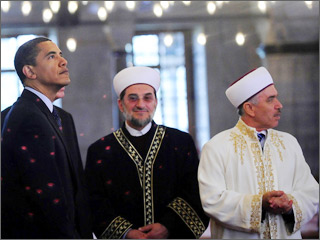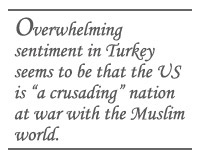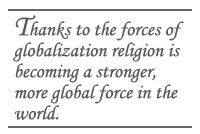Tactics in a Cosmic War
Tactics in a Cosmic War

ISTANBUL: During his historic address to the Turkish Parliament, President Barack Obama reached out to the Muslim world by stating in no uncertain terms that, “the United States is not – and will never be — at war with Islam.”
I watched the speech on Turkish TV with a group of young Muslim journalists and activists gathered in Istanbul for the second annual Alliance of Civilizations conference (Obama briefly addressed the conference later that day). A spontaneous cheer erupted in the room. A college student from Syria leaned over to me and, with emotion in her voice, said, “with those words Obama just wiped away the stain of the last eight years.”

Of course, George W. Bush often made similar statements aimed at mending ties between the US and the Muslim world. “The enemy of America is not our many Muslim friends,” Bush liked to say. But the fact is that no matter how hard he tried, Bush could never overcome the anger and mistrust he engendered across the Muslim world. Even in a country like Turkey, arguably America’s most vital ally in the Muslim world, perceptions of the US among Turks had reached record lows during the Bush years. In fact, recent polls in Turkey showed that nearly 90% of the population held unfavorable views of the US. This is an astounding figure, considering that Turkey is a modern, moderate, Muslim majority state with close ties to Israel and Europe and a sophisticated and urbane population that has absorbed all things western, from the type of music Turks listen to the books they read.
And yet, the overwhelming sentiment in Turkey seems to be that the United States is, to borrow a phrase from Osama bin Laden, “a crusading” nation at war with the Muslim world. In this opinion, the Turks are not alone. A poll by WorldPublicOpinion.Org found that nearly two-thirds of Muslims believe that the purpose of the war on terror is to “spread Christianity in the region.”

There is a simple reason for this. From the beginning, the Bush Administration consciously conceived of the ideological conflict with Al Qaeda and the global Jihadist movement as a cosmic contest between good and evil. Indeed, the first time that Bush used the phrase “war on terrorism” he equated it in no uncertain terms with a “Crusade.” Over and over again he declared that the purpose of the war was to “rid the world of evil.” In both word and deed, Bush not only provided an apocalyptic lens through which to view the military conflict with Al Qaeda, he framed the ideological conflict with radical forces in the Muslim world in the same cosmic dualism used by those who carried out the attacks of 9/11. As I argue in my new book How To Win A Cosmic War, by adopting the same religiously charged rhetoric and cosmic worldview as the Jihadists, by viewing alQada militants as a demonic force bent on destroying civilization instead of an international criminal conspiracy to be brought to justice, Bush played right into the Jihadists’ hands by setting the groundwork for a new and terrifying age of religious war.
Thanks to the forces of globalization, which have radically altered the way people define themselves both individually and as a collective, religion is becoming a stronger, more global force in the world. At the dawn of the twentieth century, one half of the world’s population identified itself as Catholic, Protestant, Muslim, or Hindu. Today, that number stands at nearly two thirds. In an increasingly globalized world, where the old demarcations of nation-states are slowly starting to give way and nationalism no longer has the grip it used to have on our collective identities, religion is once again becoming the primary marker of identity in all parts of the world.

That is why it is so important for the new administration to strip the conflicts we are witnessing across the globe, and particularly the War on Terror, of its religious connotations. Thankfully, President Obama seems to understand this. Hence, a few days before Obama arrived in Turkey, Secretary of State Hillary Clinton made it clear that the new Administration would join the rest of America’s European allies and cease using the phrase War on Terror. “The administration has stopped using the phrase and I think that speaks for itself,” Clinton said.
This is a good start. But it is not enough just to change the rhetoric of the War on Terror. The new administration must strive to address the very real grievances that fuel the Global Jihadist movement—the suffering of the Palestinians, American support for Arab dictators, and the overwhelming sense in the Muslim world of feeling under attack. It must reverse course from the Bush Administration and stop looking the other way as America’s dictatorial allies in Jordan, Egypt, Morocco, and Saudi Arabia suppress democratic movements in their countries. And it must actively engage the democratically elected Islamist leaders in Lebanon and Palestine. Because, it is inconceivable that political reform could take place in throughout the Middle East without the active participation of groups like Hizbullah and Hamas.
There are obviously risks in pushing for democracy in such a volatile region, and no one thinks such a policy would be easy to implement. There are enormous domestic hurdles in the way of promoting political participation among groups who maintain anti-American and anti-Israel sentiments. Undoubtedly, some of the governments that will arise from truly democratic elections in the Middle East may hold views that are contrary to our interests in the region. But whatever risks there may be in promoting democracy in the Middle East, they pale in comparison to the risks involved in continuing to stifle political reform in the hope of achieving stability in the region. Terrorism, as everyone knows, thrives in societies where there is no public space for people to vent their grievances, and where no political mechanism exists for those grievances to be addressed.

Addressing these grievances may not satisfy Osama bin Laden and his fellow cosmic warriors, whose sights are set beyond this world, and whose goals (for example, the recreation of the Caliphate) are too absurd to be taken seriously. But it will take away the appeal of the Jihadist movement and loosen the ties that have bound so many young, disaffected Muslims together under a master narrative of oppression and injustice. Most of all, it will deny Jihadist ideologues their principal argument that the War on Terror is, in fact, a war against Islam.
On the first day of the Alliance of Civilizations conference, Turkey’s Prime Minister Recep Tayyip Erdogan compared Obama to the city of Istanbul—a bridge between the east and the west. Thus far, Obama seems to have accepted the role of bridge builder. It may take some time for his actions to catch up with his words, but in in any ideological contest, sometime our words can be our most effective weapons.
Reza Aslan is assistant professor of creative writing at UC Riverside and the author most recently of “How To Win A Cosmic War: God, Globalization, and the End of the War on Terror.” Click here to read an excerpt.